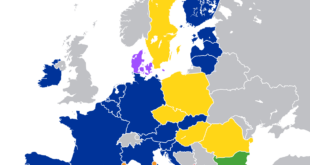- Recently, Israel signed a free trade deal with the United Arab Emirates, its first with an Arab country, building on their US-brokered normalization of relations in 2020.
- The UAE was the first Gulf country to normalize ties with Israel and only the third Arab nation to do so after Egypt and Jordan.
Highlights
- Trade between the Two Countries: In comparison to 2020, Israel’s Central Bureau of Statistics recorded more than a 30% increase in import and export of goods, excluding diamonds, to and from the United Arab Emirates.
- Two-way trade in 2021 totaled some USD 900 million.
- Non-oil trade surpassed reached USD 1.06 billion in the first three months of 2022 – a fivefold increase from the same period last year.
- Builds on the US-brokered Normalisation of Relations: The deal shows the durability of a series of diplomatic deals in 2020 known as the Abraham Accords, which normalized relations between Israel and four Muslim countries—the U.A.E., Bahrain, Morocco and Sudan.
- Israel’s relationship with the UAE has great economic potential due to the geographic and cultural proximity between the peoples, as well as the UAE’s unique characteristics.
- The UAE is the second largest economy in the Arab world (after Saudi Arabia), with significant weight placed on technology products and advanced solutions, where Israel holds a relative advantage.
- Businesses in both countries will benefit from faster access to markets and lower tariffs as these nations work together to increase trade, create jobs, promote new skills and deepen cooperation.
- The deal abolishes customs duties on 96% of the products exchanged between the two sides.
- The agreement also relates to regulatory and standardisation issues, customs, collaboration, government procurement, e-commerce and intellectual property rights.
- This deal will push the value of non-oil bilateral trade between Israel and the UAE beyond $10 billion.
- UAE-Israel trade will exceed $2 billion in 2022, rising to around $5 billion in five years, bolstered by collaboration in renewables, consumer goods, tourism and the life sciences sectors.
Significance for India
- This agreement, jointly with the Comprehensive Economic Partnership Agreement (CEPA)signed between India and the UAE, has the potential for extensive trilateral cooperation and business partnerships.
- It has also further created opportunities for collaborations in different fields with the US.
- These were made possible by the Abraham Accords, which have been a significant turning point in promoting peace and prosperity for all.
- Israel, India, the UAE, and the US are also part of a new grouping, West Asian Quad which was established as a forum for economic cooperation.
- They are pursuing a constructive agenda focused on the economy, especially infrastructure projects.
Free Trade Agreement
- FTAs are arrangements between two or more countries or trading blocs that primarily agree to reduce or eliminate customs tariff and non-tariff barriers on substantial trade between them.
- FTAs normally cover trade in goods (such as agricultural or industrial products) or trade in services (such as banking, construction, trading etc.).
- FTAs can also cover other areas such as intellectual property rights (IPRs), investment, government procurement and competition policy etc.
- Example: India has negotiated FTA with many countries e.g. Sri Lanka and various trading blocs as well e.g. ASEAN.
SOURCE: THE HINDU,THE ECONOMIC TIMES,MINT
 Chinmaya IAS Academy – Current Affairs Chinmaya IAS Academy – Current Affairs
Chinmaya IAS Academy – Current Affairs Chinmaya IAS Academy – Current Affairs



